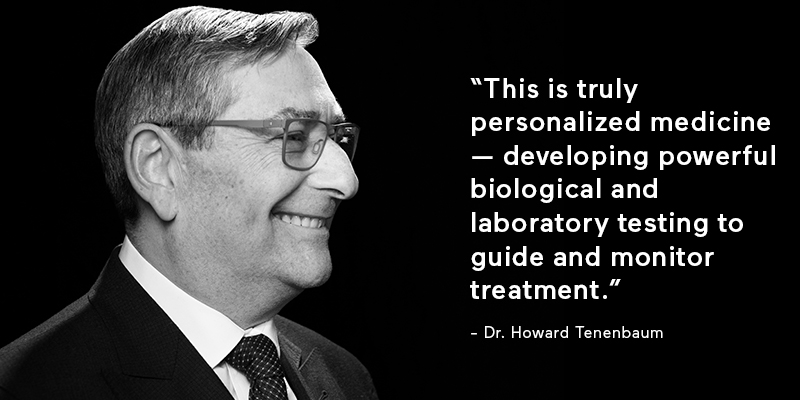
 Above: Shin Sugino, patient
Above: Shin Sugino, patient
Written By: Heidi Singer
Photos By: John Packman
The mouth is a powerful window into the health of the human body: Inflammation of the gums can be associated with heart disease, gut health and autoimmune conditions. But the significance of these links is not understood or appreciated fully.
At the same time, diseases of the gums and teeth are often overlooked in medicine — and the suffering they cause is grossly underestimated. In the most extreme cases, even children can lose their teeth, causing lifelong struggles with depression, self-esteem and anxiety.
A new research centre, based at Mount Sinai Hospital, part of Sinai Health System, is seeking to understand the biology behind oral diseases and their links to systemic health — and to eventually customize treatments for people with these often debilitating conditions. The dentists and scientists associated with this novel centre believe their research could help illuminate the role inflammation plays in all human disease.
When it opens this spring, The Centre for Advanced Dental Research & Care will treat the GTA’s most difficult cases of refractory periodontitis (a particularly treatment-resistant type of gum disease), as well as patients whose implants have failed them or at risk of failing them. The idea is to create individualized treatments for patients, based on the patient’s own biological samples. This will create a seamless and thoroughly unique connection between the patient and the research lab.
Unlike physicians, dentists don’t typically order lab work like blood and saliva tests to diagnose inflammatory and other conditions. At the Centre, this testing will be routine.
“We’ll go from the clinic to the lab and eventually back to the clinic,” says Dr. Howard Tenenbaum, Dentist-in-Chief at Sinai Health System, who will lead the Centre. “This is truly personalized medicine — developing powerful biological and laboratory testing to guide and monitor treatment.”
“I gained confidence — I just got back to my life, all the things people take for granted.”
- Shin Sugino
The Centre will combine laboratory research and patient care in real time, to create individualized treatments for people who need immediate help. The other major goal is to conduct research, then turn it into useful clinical tests and publish the findings so that they can be shared with the world.
The Centre, a partnership between Sinai Health System and the University of Toronto’s Faculty of Dentistry, is being established through the generosity of the Canadian dental management firm dentalcorp.
“We are passionate about improving oral health across the country and committed to advancing the field of dentistry,” says Graham Rosenberg, Chief Executive Officer of dentalcorp. “This partnership provides us the opportunity to support a cause that champions the care and health of Canadians, especially those who continue to suffer from complex and hard to treat conditions.”
Many of Sinai’s dentistry patients have served as early models for what the Centre can do. Shin Sugino, a Toronto filmmaker, had terrible problems with his teeth starting as a child in Tokyo. By the time he got to Mount Sinai, Shin’s upper teeth were falling out. Every year he wore a larger denture, but it never fit right. At restaurants, Shin worried about ordering anything too hard or chewy, like steak. He didn’t smile much either.
“To be 45 and walking around with a denture, your self-esteem goes down,” recalls Shin, now 70, from his Leslieville film studio.
The Sinai team replaced Shin’s entire upper row of teeth with implants placed within bone harvested from his hip. Unfortunately, almost a third of the time, painful inflammation can develop around implants, increasing the potential for complete implant failure. When Shin began to develop these symptoms, he was treated with three medications not ordinarily used on his conditions, and they completely resolved Shin’s problems.

Today, Shin returns to the hospital every three months for careful monitoring and a deep cleaning. He’s not shy about smiling anymore. He proudly reveals a perfect set of worry-free upper teeth.
“I gained confidence — I just got back to my life, all the things people take for granted,” recalls Shin, who directs TV commercials for well-known Canadian companies. “They improved my life dramatically.”
These innovative treatments are examples of the kind of work the Centre will do, in partnership with U of T researchers. Dr. Michael Glogauer, a professor in the Faculty of Dentistry, will be a key player due to his work on oral health and the interactions between plaque and the immune system, which he considers the most critical aspect of gum health.
Dr. Glogauer tries to understand what causes and maintains the inflammation that causes so much destruction in gum diseases. He focuses on neutrophils and macrophages (types of white blood cells) that cause inflammation while eliminating harmful bacteria in the mouth. (In healthy mouths, these immune cells are able to maintain health without overt inflammation.)
Recently, in trying to understand what goes wrong in severe gum disease, Dr. Glogauer made a key discovery: Different types of inflammation in the body are associated with changes in previously unknown types of neutrophils. These changes are detectable and a clinical test is being developed to identify when inflammation is waxing and waning. This would instantly reveal whether a novel treatment being developed in the Centre is working. Currently, periodontists must wait several months to determine the success or failure of treatment.
“I use the mouth as my model system to try and understand the interplay between oral diseases and systemic health.”
- Dr. Michael Glogauer
With better diagnostic and monitoring tools, Dr. Glogauer also hopes to develop tests that pinpoint the cause of gum disease, along with severe gum recession and inflammation associated with implants. For one person, it may stem from immune system irregularities, and for another, it could be bacterial. These ideas are at the heart of the Centre’s goals towards the development of personalized dental and periodontal care.
Taming inflammation and understanding the immune system are keys to the entire body’s health. And Dr. Glogauer believes there’s no better place for examining these processes than the mouth, which contains abundant amounts of bacteria and neutrophils. And of course the mouth is easily and completely visible, unlike the rest of the body’s interior.
“I’m a periodontist, but I’m first and foremost a scientist,” he says. “I use the mouth as my model system to try and understand the interplay between oral diseases and systemic health.”
Perhaps the most obvious connection is between the mouth and the gut. The body releases 300 billion neutrophils every day — and this could be ten times higher for the 30 per cent of the population with gum disease.
At least 10 per cent of these neutrophils end up in the mouth, and many are swallowed into the gut. Nobody knows whether these activated inflammatory cells cause disease, or what they do in the gut. Moreover, Dr. Glogauer has shown in mice that the numbers and types of neutrophils in the gut mirror those in the mouth. In the future, he says, a simple oral rinse could test the effectiveness of treatment of a wide array of diseases such as colitis and other inflammatory diseases of the gut. And that’s just the beginning.
“It’s now clear in the literature that there are significant and profound links between oral health and systemic health,” he says. “Oral diseases have been linked to cardiovascular diseases, like heart attack and stroke. It’s been linked to all sorts of cancers, and arthritis.”
Dr. Tenenbaum, too, is intrigued by the connection between inflammation in the mouth and disease in other parts of the body. Oral problems could be a sign, and perhaps even a cause, of other diseases.
“We’ll combine high-level treatment — as high as you can get — with biological sampling,” Dr. Tenenbaum says. “We may even create a biobank with those samples. And then, we hope to use the knowledge gained from the study of patient samples to personalize treatment for patients with oral health conditions that were either just difficult to treat or even untreatable before. There’s nothing like this anywhere.”